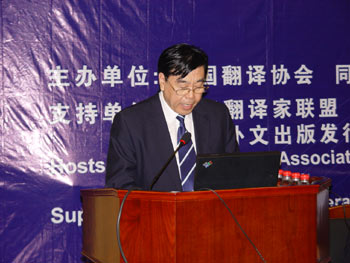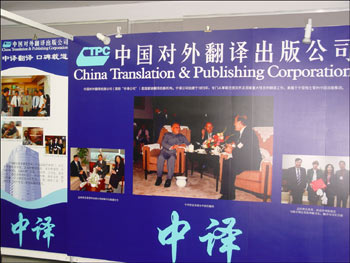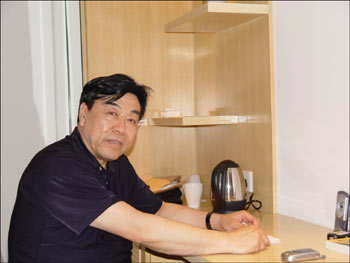| Tools: Save | Print | E-mail | Most Read |
| 'Fair Play' Encouraged in Translation Sector |
| Adjust font size: |
It was already late into night but Wu Xizeng, general manager of China Translation and Publishing Corporation (CTPC), was still bent over his desk in his Shanghai hotel room proofreading manuscripts of a book to be published soon.
Wu was in Shanghai to attend the China International Forum on Translation Industry that was held from May 28 to 29 at Tongji University.
"It's hard to expect a writer to be consistent with the style of writing or the use of technical terms throughout his or her book; but an experienced and qualified editor is duty-bound to unify and standardize them with special care," Wu said to the young editor on the other end of the telephone line. Wu had just gone through all the corrections that needed to be made with her, page by page. "I tell every newcomer in my company to start with small, simple things. Like when solving a mathematical problem; a minor mistake in any of the steps could lead to a wrong final answer," said Wu who majored in mathematics at Tsinghua University in Beijing. "Having no fear of difficulties, fostering a team spirit and sustaining an insatiable appetite for learning -- these are the key to a person's success," he said in an exclusive interview with china.org.cn on the eve of the forum. The forum was the first top-level international gathering for the translation industry to be held in China. "Driven by economic globalization and its entry into the WTO, China has witnessed a sharply increasing demand for translation services in recent years," Wu said. "Statistics show that the output value of the global translation market reached US$13 billion in 2004 and US$22.7 billion in 2005, while that of China's market was 12.7 billion yuan (US$1.6 billion) and 20 billion yuan (US$2.5 billion) respectively." However, the market in China is far from mature or regulated, primarily because its development lags behind many other industries. During the time of China's planned economy, translation agencies mainly provided services for governments and government organizations at various levels. Citing his own company as an example, Wu said its predecessor was the UN Documentation Translation Group established in Beijing in 1973 after the People's Republic of China had restored its legal status at the UN two years earlier. Originally, its major task was to translate UN documents into Chinese, one of the six official and working languages of the UN.
With the introduction of the market economy, translation companies have mushroomed, although the majority is in some way government-related. Wu pointed out that the privately run agencies tend to be small-scale. "Since supply now exceeds demand, customers often choose companies that charge low fees without considering the quality of their services. This has resulted in an escalating price war that has thrown the market into disarray," he said. Guanyuan is a flea market close to Wu's Beijing-based company where fake and shoddy products are sold at low prices. "I always remind my employees to resist the lure of cheap goods and stay away from Guanyuan," he said, "because it's against our own management principles and business strategy." For years, CTPC has adhered to its motto of "providing high-quality translation services," earning it wide acclaim at home and abroad. An open and fair market environment with more stringent market access standards is essential to the development of the translation sector, Wu said. And to increase their competitiveness in a well-regulated market, both state-owned and private enterprises should adopt the joint stock system. "It's the road to success," he stressed. Currently China has about 60,000 professional translators and interpreters, and hundreds of thousands of people are engaged in a variety of translation work. So, inevitably the bad has become mixed with the good. In Wu's opinion, specialization and professionalism are the qualities that make a well-trained translation professional. "There's a subtle distinction between the two concepts," he explained. "Facing keen competition, an employee must first be proficient in doing his or her job. But it's not enough. Besides vocational skill, professionalism also calls for business sense and work ethics." After graduating from Tsinghua in 1968, Wu first worked as a radio engineer. It was while he was compiling the mathematical volume of the Encyclopedia of China, a program that ran from 1978 to 1988, that he made his foray into the publishing industry. His most unforgettable experience to date in his long and illustrious publishing career is having presided over the compilation of the Concise Encyclopedia of China.
"From 1991, I devoted six years of my life to this arduous task that seemed to have very little hope of success at the time," Wu recalled. "But as the Chinese proverb goes: 'One fights to live when confronted with the threat of death'." Published in 1996, the 12-volumed Concise Encyclopedia of China (first edition) won an honorary prize at the Third National Book Awards, the first prize at the Second National Dictionary Award, and an 11th National Best-sellers Award.
"What I've learned from compiling it is that one should have the courage to accept a challenge and never give up," he said. (China.org.cn by staff reporter Shao Da, June 12, 2006) |
| Tools: Save | Print | E-mail | Most Read |
 |
| Related Stories |
| Product Directory China Search |
Country Search Hot Buys |


